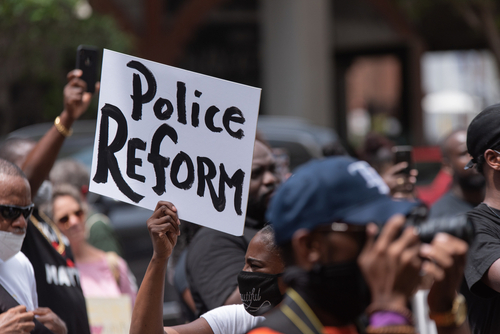Police reform and homeland security: Some policy recommendations to close the racial justice gap

Image from Shutterstock.com.
Last summer, in response to the killing of George Floyd and other victims of police brutality and amid a public health crisis and economic collapse, Americans saw an overdue reckoning with racial injustice. Around the country, large swaths of peaceful multigenerational, multiracial demonstrators marched to demand social justice and racial equity.
In 2013, the Black Lives Matter social movement was founded to avenge the killing of Trayvon Martin, a Black teenager shot by George Zimmerman, who claimed he mistook a bag of Skittles that Martin was holding for a weapon. The movement sought to bring to light the deaths of Martin and so many other innocent victims whose lives were unjustly taken, despite no subsequent legal accountability.
As nonviolent protesters demanded racial justice reforms, challenged police brutality and sought to undermine white supremacy, rioting and looting erupted in some parts of the country. In response, then-President Donald Trump described the protesters as “thugs,” “terrorists,” and he called a Black Lives Matter mural “a symbol of hate.” His political rhetoric demonizing, dehumanizing and denigrating fellow Americans engaged in constitutionally protected activities was coupled with state-sanctioned violence. In Portland, Oregon, for instance, heavily armed, unidentified security forces apprehended protesters in unmarked cars without any lawful justification.
Moreover, the social justice protests in Portland culminated in more than 300 domestic terrorism investigations. Under the Trump administration, the protests inspired a new federal task force focused on “antigovernment extremists” but stated that white supremacist threats fell outside its purview.

In contradistinction, a quarantined America watched the Jan. 6 assault on the Capitol where insurrectionists, who included current and former police and military personnel armed with guns, body armor and military-grade tactical gear, were met with a minimal security response. Indeed, the Jan. 6 insurrectionists—who called for the execution of the vice president and the speaker of the house and planted two pipe bombs just blocks away from the offices of the Democratic and Republican national committees—saw no such brute force. Some were far-right extremists armed with weapons, cuffs and mace with every intention to storm the Capitol.
Since the historic attack on a national democratic institution and in response to official excuses justifying intelligence failures, some commentators have argued that right-wing extremism enjoys relative impunity under the guise of preserving civil freedoms under the First Amendment. On the other hand, nonviolent social justice movements advancing the interests of marginalized communities—such as Black Lives Matter—are violently repressed to ensure “public safety.”
The disparate response to violent insurrectionists who made credible threats against democratic institutions and lawmakers brought into sharp relief the brutal manner in which African Americans and people of color are overpoliced and criminalized without equal regard for their First Amendment rights.
In the wake of America’s racial reckoning, the ABA Section of Civil Rights and Social Justice Rights of Immigrants Committee in strategic partnership with the German Marshall Fund of the United States, sponsored a virtual session with an interdisciplinary panel of experts to explore policing reform as part of a two-day policy summit. While recognizing the officers who do not abuse their state-sanctioned authorities, the discussion culminated in a slate of practical policy recommendations to help dismantle institutionalized racism and racial inequality.
Recommit to protecting the First Amendment rights of all Americans
Local, state and federal government officials should refrain from investigating and surveilling First Amendment protected speech and association. Rather than focusing on protest movements and political dissent, investigate cases where there is evidence to believe that subjects are engaged in criminal wrongdoing. Additionally, the newly reconstituted U.S. Congress should pass the Justice in Policing Act that prohibits racial, religious and discriminatory profiling by creating distinct cause of action for victims.
Require annual reports on domestic extremism
Local, state and federal government officials should report data regarding domestic extremist threats, investigations and prosecutions on an annual basis. Such data should detail alleged sources of extremism to facilitate public oversight and accountability. For instance, while the racial justice protests in Portland, Oregon, culminated in more than 300 domestic terrorism investigations, the Jan. 6 attack on the Capitol resulted in two dozen such cases.
Are demands for racial equality a greater homeland security threat than armed insurrectionists who called for the execution of lawmakers while unlawfully interfering with government functions and democratic processes? Publicly accessible disaggregated data is necessary to ensure official resources are properly allocated to actual national security threats, such as those emanating from right-wing extremists and white supremacists.
Screen for explicit biases, train on implicit biases
Official abuses often stem from mentalities that perceive Black communities as inferior, criminal and violent. According to this mentality, they are dangerous populations that must be controlled and against whom lethal force is justified. To disrupt a culture of fear, racial hatred and anti-Black stereotypes, police departments should actively screen applicants for explicit biases. For instance, police agencies may review social media accounts for explicitly racist and bigoted content that contributes to abuses against marginalized communities.
In addition, annual implicit bias trainings make officers aware of unconscious biases that inform their perceptions of the communities they are required to serve and protect. In New Jersey, for instance, Gov. Phil Murphy recently signed legislation that mandates implicit bias and cultural diversity training for all law enforcement officers. According to a recent study assessing the effects of such trainings on the New York Police Department, officers expressed a greater awareness and willingness to manage such biases.
Maintain public databases on police misconduct complaints
Open local, state and federal misconduct complaints to the public to ensure that departments are taking proper steps to hold officers accountable. Representative citizen transparency efforts include the Citizens Police Data Project in Chicago and CAPstat, which details federal civil rights lawsuits against police in New York City.
Establish community oversight boards
To ensure police accountability and citizen engagement, empower local community members to review misconduct complaints. This should include the ability to require the production of documents and witnesses, publish reports and make binding disciplinary decisions. Such structures will ensure transparency, accountability and participatory democracy to check and curb abuses of power.
 Engy Abdelkader.
Engy Abdelkader.
Demilitarize the police
Section 1033 of the National Defense Authorization Act permits the Pentagon to transfer excess military weapons, equipment and vehicles to police departments. Since its inception in 1996, more than $7.4 billion in weaponry has been transferred to local police departments. Such access has facilitated disproportionately violent contact with marginalized communities who are civilians, not enemy combatants.
In 2014, for instance, police suppressed racial justice protests following the shooting death of Michael Brown—an unarmed Black man by a white officer—in Ferguson, Missouri, with armored vehicles, rubber bullets and camouflage vests.
In Ferguson’s aftermath, President Barack Obama instituted restrictions that Trump subsequently rescinded. The U.S. Congress should repeal Section 1033 and pass the Justice in Policing Act, which prohibits the transfer of bayonets, silencers, armored vehicles, armored drones, grenades and grenade launchers.
Engy Abdelkader is chair of the ABA Section of Civil Rights and Social Justice Rights of Immigrants Committee and a fellow with the German Marshall Fund of the United States. She teaches at Rutgers University.



